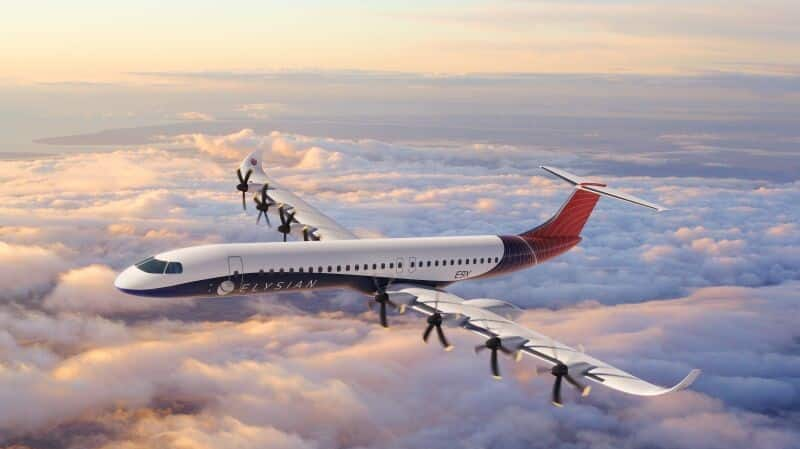
This 90-passenger electric plane can fly over 800km per charge
What's the story
Dutch start-up Elysian has announced plans for an electric regional aircraft, with the capacity to carry 90 passengers up to 805km.
The company's ambitious project aims to reduce emissions by 90%, and is set to challenge industry consensus regarding the readiness of battery technology for electric passenger aircraft.
Elysian's Director of Design and Engineering, Reynard de Vries, stated that contrary to popular belief, one can fly much farther with battery-powered electric aircraft if the right choices are made.
Prototype
A vision for the future of air travel
The proposed plane, named E9X, currently exists only in concept. Elysian wants to build a scale model within two to three years, and a full-scale prototype by 2030.
The design has eight propeller engines and a wingspan of almost 138 feet (42 meters), bigger than a Boeing 737 or an Airbus A320.
However, de Vries says its thinner fuselage improves both structural and aerodynamic characteristics.
Design
Elysian's unique design approach
The E9X's design is a product of a collaboration with Delft University of Technology, Netherlands.
A key facility is that the batteries will be placed in wings, rather than fuselage.
De Vries explained, "Batteries represent a significant chunk of the weight of the plane, and what you want to do with weight is put it where the lift is being generated."
The battery technology will be similar to what's available today, plus any advancements made in the next 4-5 years.
Features
Aiming for reduced climate impact and enhanced experience
The E9X will feature landing gear placed in the wings, wingtips which can fold up to save space, and a gas-turbine-based "reserve energy system" for emergency power.
De Vries expects the airplane's climate impact to be between 75% and 90% lower than today's narrowbody jets.
From a passenger perspective, de Vries hopes the E9X will offer a quieter, more enjoyable flight experience.
The plane is designed to fit within the current airport infrastructure.
Impact
A potential game-changer for secondary airfields
Charging the batteries of the E9X may extend turnaround times, with a target maximum charging time of 45 minutes, according to de Vries.
He added that the average time will possibly be around half an hour.
Currently, Elysian is in discussions with airlines worldwide. The E9X could benefit secondary airfields currently underserved due to noise or emissions limitations, offering a quieter and more environmentally friendly alternative.
Rivals
Elysian faces stiff competition
Elysian is not alone in the race to develop electric aircraft.
British-American ZeroAvia has test-flown a 19-seater plane fueled by two hydrogen-electric engines, and aims to enter service in late 2025.
Israeli-founded Eviation plans to put its nine-passenger commuter plane into service in 2027, while Swedish manufacturer Heart Aerospace aims for commercial service in 2028 with its 30-passenger plane.
Aviation analyst Gary Crichlow from consultancy firm AviationValues warns that Elysian faces a tough challenge ahead.